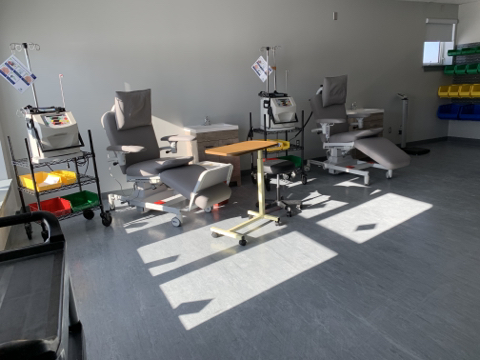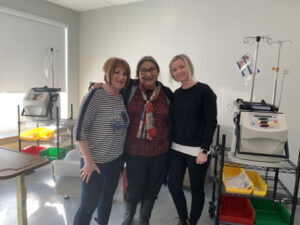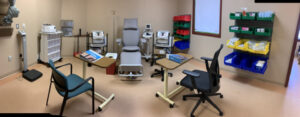The former Labrador-Grenfell Regional Health Authority (now the Labrador Grenfell Zone of NL Health Services) is responsible for a full range of services, including community health, long-term care, and acute care for Northern Newfoundland and all of Labrador. Serving a population of approximately 37,000, it operates hospitals in St. Anthony, Happy Valley-Goose Bay, and Labrador City, three community health centers, fourteen community clinics/nursing stations and three long term care homes.
There have been increasing incidences of renal disease within Newfoundland and Labrador. A high proportion of these clients in end-stage renal disease are clients of Labrador Grenfell Health Zone, with a total of 36 clients via three in-center hemodialysis units. The dialysis unit in Central Labrador services Happy Valley-Goose Bay, Sheshatshiu, North West River, and all Northern Coastal communities of Labrador.
In comparison to the rest of the province, Labrador Grenfell Zone is unique in that, in Central Labrador, there is a high population of indigenous Canadians. Diabetes is a predominant comorbidity among indigenous Canadians. According to the Canadian Agency for Drugs and Technologies in Health (CADTH) the prevalence of diabetic nephropathy is 50% higher in indigenous men and even higher in indigenous women and estimates show rates of end-stage chronic kidney disease to be four times higher in indigenous Canadians than in the general Canadian population. This younger population who are in renal failure in Central Labrador will precipitate higher needs for a renal replacement therapy in the future.
Labrador Grenfell Zone has hemodialysis clients throughout the region who meet the criteria for home-based dialysis therapies with numbers steadily increasing. With appropriate assessment, support, and recommendation from a nephrologist, these clients could now potentially shift from in-center to home hemodialysis. Research has shown that home hemodialysis is efficient, more cost effective, and increases the client’s quality of life.
Clients currently receiving in-center hemodialysis will benefit from a home dialysis program and progressive renal insufficiency (PRI) support. PRI clinics provide recommendations and guidelines to sustain native renal function thereby slowing the progression of chronic kidney disease and increasing the time it takes for a client to need renal replacement therapy. The lack of an LGH focused PRI clinic often resulted in clients rapidly progressing to renal replacement therapy (i.e., in-center hemodialysis) and led to costly interventions and poorer client outcomes. To meet future needs as projected by PRI data, a program designated towards PRI and home hemodialysis would provide a significant, positive impact for clients.
Those clients identified at risk will be followed under this program by a designated PRI/Home Dialysis Nurse in consultation with a Nephrologist. Clients will be provided with the necessary education and renal recommendations to prolong native renal function, thereby reducing the need for costly in-center hemodialysis. The goal is to eliminate or slow the need for renal replacement therapy in the future.
As a client approaches a renal replacement therapy, education and nephrology assessment are provided early in the program, thereby increasing the likelihood of clients choosing a more cost-effective home-based therapy which also provides a better quality of life for the client. Central Labrador has one of the youngest and most rapidly growing populations of chronic kidney disease in Canada.
The goal of this project was to implement a home-based dialysis program to encompass both modalities to meet future projected needs for the clients of Central Labrador. From a PRI perspective, the objective is to work collaboratively with Indigenous community members and health care professionals to slow the progression of chronic kidney disease. From a home-based dialysis program perspective, the goal is to shift stable clients from the in-center hemodialysis unit to a home based unit in the Mani Ashini Clinic, thereby keeping clients in their community and providing a better quality of life.
“The generous donation of $160,000 from the International Grenfell Association, and in partnership with the Sheshatshiu Innu First Nations community, the Labrador-Grenfell Zone of Newfoundland and Labrador Health Services was able to successfully secure the equipment to establish the Home-Based Dialysis training room at the Labrador Health Centre in Happy Valley-Goose Bay. Additionally, the funding provided two additional dialysis stations in the newly renovated space within the Mani Ashini Community Clinic in Sheshatshiu.
A total of five dialysis machines were purchased along with three powered dialysis chairs and a variety of other equipment to complete the two areas.
The funding has supported the ability for Indigenous clients to receive care closer to their homes, their culture, and their families, while also aligning with the Strategic Plan of the Labrador-Grenfell Zone to provide enhanced access to care that is patient and family centered.”
Nadine Calloway
Regional Director
Rehabilitation, Intervention Services and Community Support
Newfoundland and Labrador Health Services, Labrador-Grenfell Zone




